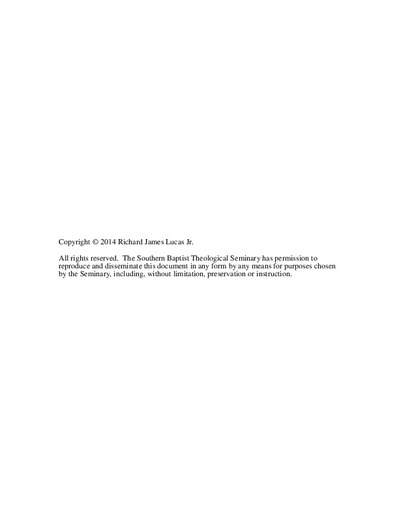Was Paul Prooftexting? Paul's Use of the Old Testament as Illustrated through Three Debated Texts
Subject
Paul, the Apostle, SaintBible. Epistles of Paul--Criticism, interpretation, etc.
Bible. Old Testament--Quotations in the New Testament
Intertextuality in the Bible
Abstract
Chapter 1 introduces the particular problem to be addressed and also the thesis of the dissertation as a potential answer to this problem. The three test case passages are briefly introduced as well as the rationale for their selection. Attention is then given to surveying the history of modern research by examining those scholars who maintain that Paul's use of the OT is either a generally non-contextually rooted approach or a contextually rooted approach, respectively. The closing section sets out the methodology of examination.
Each of the next three chapters is given to the three hard cases of Paul's use of the OT. Paul's use of Isaiah 59:20-21 and 27:9 in Romans 11:26-27 is discussed in chapter 2 and demonstrated to be a contextually rooted use of the OT by arguing that Paul employs these passages with the same burden as their OT context, namely that one day all Israel will be saved. However, in Paul's modified form it also serves to reinforce the mystery concerning how that salvation will take place.
Chapter 3 is a focused interaction with Paul's use of Psalm 68:18 in Ephesians 4:8. After discussing the inadequacies of the various approaches which seek to locate Paul's form of the text as employing an existing interpretive tradition, it is argued that Paul modified the wording of the quotation, not to disregard the OT context, but rather to summarize succinctly the entire psalm and use it to draw together several important themes in his letter.
The quotation of Isaiah 25:8 and Hosea 13:14 in 1 Corinthians 15:54-55 is the subject of chapter 4. While Paul does again modify these texts, he builds upon their original contexts as a way of showing how Christ's resurrection has conquered death. The judgment prophesied in the OT context has been poured out on Christ, thereby clearing a path for resurrection life for his people.
Chapter 5 concludes with a synthesis of Paul's hermeneutical method in these passages. Paul's use of the OT is contextually rooted, but also comes through the interpretive lens of the apostle in light of his place in redemptive history.

